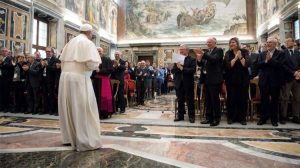
By Ann Marie Foley - 28 December, 2017

Pope Francis addresses journalists
Pope Francis has urged journalists not to be at the mercy of easy slogans or campaigns, which “manipulate reality, opinions and people themselves, often producing a useless “media outcry”.
Speaking to Members of the Italian Periodical Press Union (USPI) and the Italian Federation of Catholic Weeklies (FISC), he said that they have a mission to inform correctly, and to offer real version of the facts, and make complex problems accessible to a wide audience. “Your voice, free and responsible, is fundamental for the growth of any society that wishes to be called democratic, so that the continuous exchange of ideas and a profitable debate based on real and correctly reported data can be guaranteed,” he said.
He acknowledged that these times are dominated by speed and sensationalism, and by the “calculated overheating of emotion” rather than thoughtful reflection. He added that there is an urgent need for reliable information, verified data and news, “which does not aim to amaze and excite, but rather to make readers develop a healthy critical sense, enabling them to ask themselves appropriate questions and reach justified conclusions.”
He said that small media companies and publishing houses are in a better position to do this as they are less exposed to the pressures and fashions. They are closer to communities, and thus more anchored to the facts, the interests and sensibilities of their subjects and audiences.
Speaking of the diocesan weeklies of FISC, in particular to their journalists who were present at the meeting, he said they can be useful instruments of evangelisation, and a place where diocesan life can validly be expressed.
“Working in the diocesan weekly means to “feel” in a special way alongside the local Church, to live close to the people of cities and towns, and above all to interpret events in the light of the Gospel and of the teaching of the Church. These elements are the compass of their particular way of carrying out journalism, of telling news and expressing opinions,” he said.
In this light the diocesan weeklies, in print and via new forms of digital communication, are important. But they need the renewed commitment of pastors, and of the entire Christian community and the benevolence of the public authorities. He spoke of society’s right to information that can be scrupulously respected, and that respects the dignity of every human being involved in the information process, so that no one damaged.
“We must not fall prey to the “sins of communication”: disinformation – that is, giving just one side of the argument – slander, which is sensationalistic, or defamation, looking for outdated and old things, and bringing them to light today; they are very grave sins, which damage the heart of the journalist and harm people,” he said.
He added that that for all these reasons the vitality of these periodicals should be protected and the employment rights and dignity of proper pay for all those who work in this field should be protected.
The Pope concluded by encouraging all the journalists present to continue their work with commitment and trust. He invited civil society and its institutions to do everything possible to ensure that the media and small publishing industry can carry out its “indispensable task, to preside over an authentic pluralism and to give voice to the wealth of the various local communities and their territories.”
Pope Francis was speaking to representatives of around three thousand newspapers published or transmitted, both in paper and in digital form, medium and small publishing companies and non-profit organisations and associations. Their gathering took place in the Clementine Hall of the Vatican Apostolic Palace, just before Christmas.